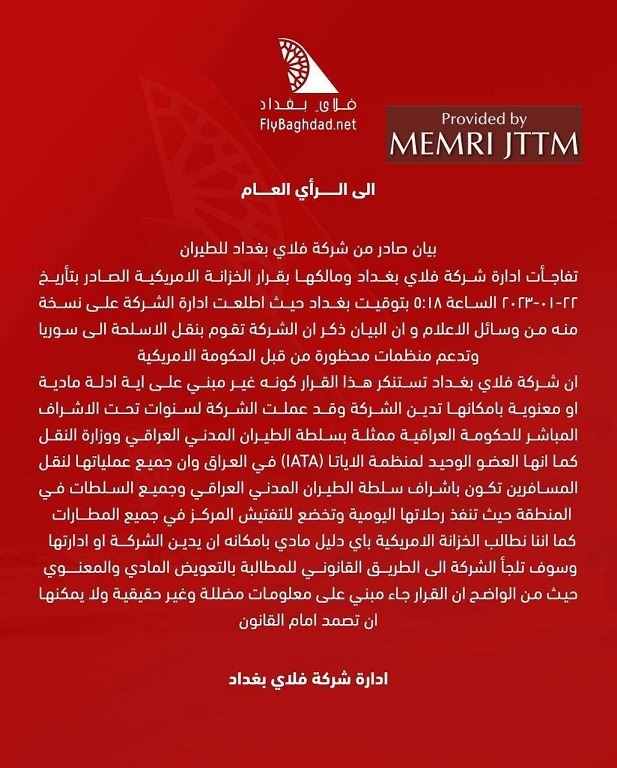The following report is now a complimentary offering from MEMRI's Jihad and Terrorism Threat Monitor (JTTM). For JTTM subscription information, click here.
On January 22, 2024, the U.S. Department of the Treasury's Office of Foreign Assets Control (OFAC) designated the Iraqi airline "Fly Baghdad," and its CEO, Basheer Abdulkadhim Alwan Al-Shabbani, for "providing assistance to the Islamic Revolutionary Guard Corps–Qods Force (IRGC-QF) and its proxy groups in Iraq, Syria, and Lebanon."[1]
OFAC has also designated three leaders and supporters of one of the IRGC-QF's Iran-aligned militias in Iraq, Kata'ib Hizbullah (KH), as well as a business that moves and launders funds for KH, according to a press release published on the U.S. Treasury's website.
The three designated leaders are: Hussein Mo'nis, a senior member and spokesman of KH and currently the head of KH’s political party; Harakat Hoquq, and Riyad Ali Hussein Al-Azzawi, whom the press release identified as an "unmanned aerial vehicle (UAV) specialist and an engineer for the Popular Mobilization Unit's (PMU) Directorate of Technical Equipment (DTE), Awqad Muhsin Faraj Al-Hamidawi, "the youngest brother of U.S.-designated KH Secretary General Ahmad al-Hamidawi, who directs KH's businesses and aspects of KH's financial portfolio."
Fly Baghdad States: "No Legal Basis" For Designation
A Telegram channel linked to KH, "Al-Kornit Al-Katabai," published a statement issued by Fly Baghdad responding to the U.S. designation:
"Fly Baghdad denounces this decision, as it is not based on any material or moral evidence that could implicate the company. The company has worked for years under the direct supervision of the Iraqi government, represented by the Iraqi Civil Aviation Authority and the Ministry of Transport. It is also the only member of the IATA [International Air Transport Association] organization in Iraq, and all its operations for transportation passengers will be under the supervision of the Iraqi Civil Aviation Authority and all authorities in the region, as they carry out their daily flights, and are subject to central inspection at all airports. We also demand that the U.S. Treasury provide any material evidence that could implicate the company or its management. The company will resort to legal methods to demand material and moral compensation, as it is clear that the decision was based on misleading and unreal information that has no legal basis."[2]

The full text of this post is available to subscribers.
Please login or register to request subscription information from MEMRI






